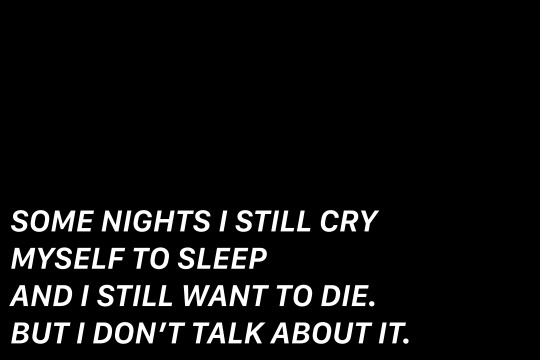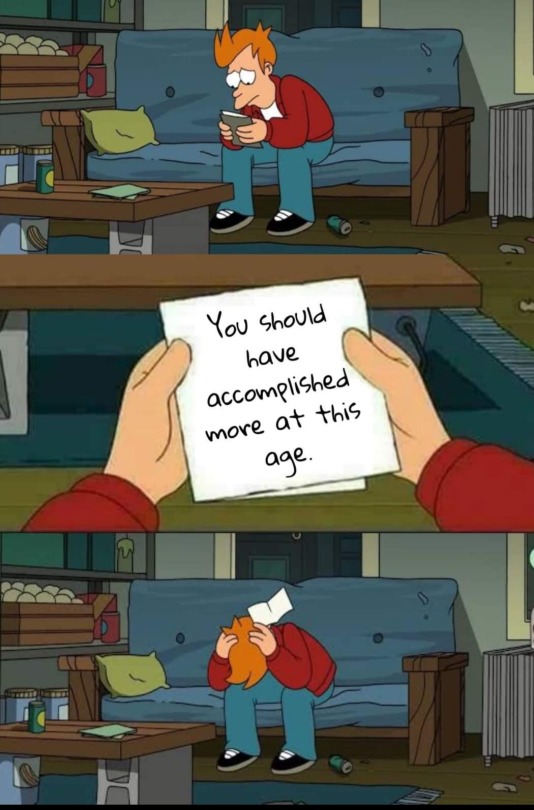Don't wanna be here? Send us removal request.
Photo

@fuckmyaesthetics @xxaloneinthedarkxx8 @pillsperfumeandparanoia @snowweatherworld @briana-forreal @faeriesunphoenix @lexiarabella-blog @tarheart @stuffjezzlikes @basedmuhammad @hunterrjamess @kayafangirl @searchingloading @the-screaming-silence @heismypo @dirtbiker198 @illuminatedenlightenment @biblesandbottles
Ray-Ban Sunglasses
5 notes
·
View notes
Text
Imagine the drama if apple added a feature that notified you if someone took a screenshot of your conversation
182K notes
·
View notes
Text
‘what do you even talk about with people online so much?’

142K notes
·
View notes
Text
Borderline personality disorder (BPD) is a type of mental health condition that’s known for fluctuations in mood and behaviors. People with BPD may also struggle with relationships as well as their own self-image.
You may be familiar with BPD, but there are also other subtypes of this condition. One such subtype is known as “quiet” BPD, which means that you direct your struggles more inward so others don’t notice.
Quiet BPD is difficult to diagnose and treat, but the earlier you seek help, the better the outcome. Here’s what you need to know.
What is quiet BPD?
To date, there are four recognized types of BPD:
discouraged (“quiet”) borderline
self-destructive borderline
impulsive borderline
petulant borderline
As with other mental illness terms, “quiet” BPD can be misleading.
Having quiet BPD means that you direct any mood swings and behaviors inward, rather than directing them toward others. In other words, you “act in,” rather than “act out.”
Acting inward can complicate an already invisible mental illness. With quiet BPD, you may direct significant feelings toward yourself without letting others see them. Such intense emotions may include:
anger
anxiety
emotional attachments/obsessions
fear of abandonment or rejection
mood swings
self-blame and guilt
severe self-doubt
rage
Quiet BPD is also sometimes called “high-functioning” BPD.
This is another potentially misleading term that indicates a person with this type of BPD may not “show” their symptoms and are still able to cope in everyday situations, such as work and school.
What are the symptoms of quiet BPD?
Since quiet BPD tends to manifest inward, this form of borderline personality may be difficult to identify at first. Some of the most notable symptoms of quiet BPD include:
mood swings that can last for as little as a few hours, or up to a few days, but no one else can see them
suppressing feelings of anger or denying that you feel angry
withdrawing when you’re upset
avoiding talking to others who have upset you and cutting them off instead
blaming yourself whenever there’s a conflict
persistent feelings of guilt and shame
having a “thin skin” and taking things personally
extremely poor self-esteem
feeling like you’re a burden to others
feelings of numbness or emptiness
feeling detached from the world and sometimes feeling like you’re in a dream (derealization)
people-pleasing, even at a cost to yourself
deep-seated fear of rejection
social anxiety and self-isolation
fear of being alone, yet pushing people away at the same time
inability to build connections with others (depersonalization)
self-harm or suicidal thoughts
Keep in mind that some people with quiet BPD may experience just a few of these symptoms, while others might experience more.
What are the possible side effects or complications of quiet BPD?
Many people with quiet BPD struggle in silence out of fear of burdening anyone. Without help, though, the symptoms may worsen over time.
Increased risk of other mental disorders
This type of borderline disorder may increase your risk of other mental health disorders, including:
bipolar disorder
depression
eating disorders
generalized anxiety
social anxiety
substance abuse
Hard to establish and sustain relationships.
It can be difficult to establish and sustain relationships when you have quiet BPD, and some of the related symptoms can cause even more difficulties in this area.
You might find it hard to connect emotionally with others because of the constant push and pull where you’re afraid of getting hurt but are also afraid of being alone.
Difficult to maintain work or school schedule.
You might also find it increasingly challenging to maintain your role at work or in school.
Untreated quiet BPD may increase your risk for acting out impulsively, and engaging in uncontrolled spending, gambling, drinking, and other dangerous behaviors.
Self-harm and suicidal thoughts may occur
Self-harm and suicidal thoughts or actions may also take hold. Always take any talk or feelings of suicide seriously.
If you think someone is at immediate risk of self-harm or hurting another person:
Call 911 or your local emergency number.
Stay with the person until help arrives.
Remove any guns, knives, medications, or other things that may cause harm.
Listen, but don’t judge, argue, threaten, or yell.
If you or someone you know is considering suicide, get help from a crisis or suicide prevention hotline. Try the National Suicide Prevention Lifeline at 800-273-8255.
50 notes
·
View notes
Text

“I smile, I try, but truth is I want to die”
11K notes
·
View notes
Text
It’s mental health awareness month! How to support someone with Dissociative Identity Disorder.
If they disclose to you that they have DID:
DO:
• Accept them. Tell them that you still respect and care for them.
• Tell them that you are there if they need your help.
• Tell them to let you know if there are any triggers that are important for you to know. If they choose to tell you any, be patient and understanding. Listen attentively.
Helpful things to say or ask:
• “Is there anything you need me to do to make sure you feel safe in our relationship?
• “If you want to tell me more about it, I am here to listen.”
• “If there are any triggers you think I should be aware of, please let me know.”
• “I’m here if you need help with anything.”
• “I still love you and you are still my friend/family/partner.”
DON’T:
• Ask if they are dangerous or if they are going to harm you.
• Ask them what their trauma is.
• Call them crazy.
• Suggest that their mental illness is caused by supernatural or pseudoscientific means. (AKA, NEVER suggest that someone is possessed or haunted.)
• Bombard them with questions.
• Demand proof.
• Force then to switch as evidence.
• React in an unkind or rude way.
• Minimize or invalidate them.
• Tell them DID isn’t real.
• Deny their existence or refuse to call their alters by their names.
• Demand any answers from them.
Unhelpful things to say or ask:
• “I’ve known you for [span of time]. I would have noticed if you had it.”
• “It’s fine as long as you aren’t going to murder me.”
• “What’s your trauma? Did [traumatic event] happen to you?”
• “Isn’t that really rare? How could you have it?”
• “You had an easy childhood so there’s no way.”
• “You don’t know what ‘hard’ is.” “You were lucky to have the childhood you had.”
• “I just don’t get why you’re doing this to me.”
• “Can you imagine how hard this is for me?”
• “Tell me your triggers.”
If they’re switching or dissociating:
DO:
• Be patient with them.
• Tell them that it’s okay, and to take their time.
• Politely ask who’s fronting.
• Reintroduce yourself, as if a new person just walked into the room.
• Fill them in if they are unaware of what is going on.
DON’T:
• Snap or clap in their face.
• Express that you only want to interact with the previously fronting alter.
• Raise your voice, or try to force them to “snap out of” their dissociation.
• Ask if they are going to harm you, or if they are “evil”.
• Tell them “they should know what’s happening”, or refuse to fill them in on what is happening.
• Accuse or blame them for not being a good friend, not listening, or dissociating. 
DID is a highly stigmatized disorder. People fear disclosing this disorder to their loved ones, because their safety could be compromised. They trusted you enough to tell you. It is your job to create a space of love, acceptance, and respect for them.
🖤 Delphine
15K notes
·
View notes
Text
🖤
Psychisch krank zu sein, bedeutet nicht zu einem Arzt gehen zu können und ein Medikament zu bekommen. Es funktioniert nicht, dass man es eine Woche nimmt und die Krankheit verschwindet wie eine Grippe. Psychische Krankheiten sind lästiger. Sie bleiben. Sie nisten sich ein und es ist egal wie du dich wehrst. Du kannst schreien und Wände einschlagen, du kannst weinen oder so tun als wäre nichts. Es hilft nicht. Nichts hilft. Es nimmt dich ein und lässt dich nicht mehr los, bis du daran zu Grunde gehst. Denn erst das ist der Punkt, an dem den meisten klar wird, dass es nicht nur eine Phase ist, nicht nur Einbildung. Und auch erst jetzt merken Freunde oder Familie es. Genau das ist der Momemt, im dem sie alle mit dir reden wollen. Aber du kannst nicht reden. Irgendwann geht das nicht mehr. Das verstehen sie alle nicht. Sie verlangen von dir, dass du gesund wirst und das du deine Entscheidungen triffst. Das du sie richtig triffst. Aber du kannst sie gar nicht mehr treffen. Denn wie zur Hölle sollst du eine Entscheidung treffen, wenn du nicht einmal mehr klar denken kannst? Dann gehen sie. Sie gehen alle, weil sie denken, dass du dich an der Krankheit festkrallst. Dass du sie gar nicht los werden willst, weil du scheinbar gar nichts tust. Psychische Krankheiten zerstören alles um dich herum. Sie zerstören dich. Und du kannst es nicht alleine aufhalten. Das funktioniert nicht. Nichts funktioniert mehr. Irgendwann kannst du es auch vor niemandem mehr verbergen. Es wird auch niemand verstehen. Du bist allein. Du kannst nichts tun.
13K notes
·
View notes
Text
Ich habe einfach Angst. Angst davor nicht schön oder gut genug für jemanden zu sein. Ich habe Angst davor, dass sich jemand wieder gegen mich entscheidet und mich fallen lässt...
Abgestosender 🦋
754 notes
·
View notes
Text
“Müde und erschöpft vom nichts tun, weil selbst atmen zur Anstrengung wird, wenn der Grund dazu fehlt”
—
4K notes
·
View notes
Text
it’s easier to say “im tired” than “im so sad and lonely i feel like there’s a weight in my chest and my body is so heavy i have no energy emotionally, physically or mentally to even move from my bed”
251K notes
·
View notes






